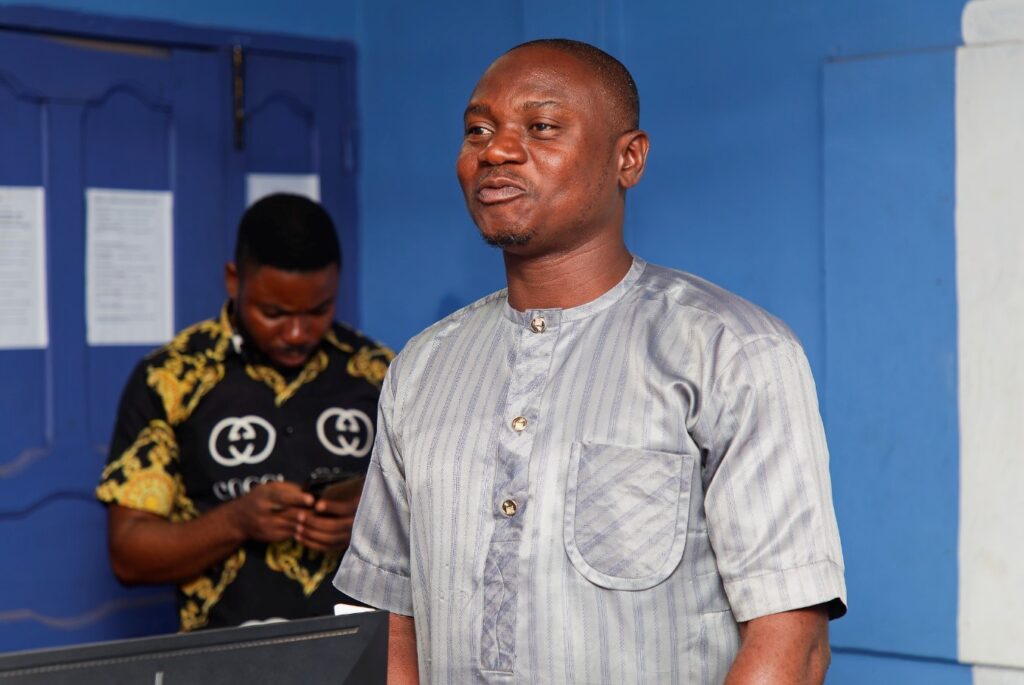The Artificial Intelligence for Sustainable Development (AI4SD) project has extended its Robotics Initiative to Uthmaniya Senior High School, inaugurating a new Robotics Club aimed at nurturing the next generation of STEM leaders.
The Assistant Headmaster for Academics, Mr. Mustapha Osman, who represented the Headmaster, welcomed the AI4SD and RAIL team.

Meeting with management
He expressed the school’s deep appreciation for the continuous support from KNUST and commended AI4SD for selecting Uthmaniya SHS as a beneficiary of this transformative initiative.

Mr. Mustapha Osman, Assistant Headmaster Academics
“We are already witnessing the positive strides made through our partnership with KNUST. The inauguration of this club marks another milestone. We urge our students to show discipline and take full advantage of this opportunity,” Mr. Osman remarked.
The project is funded by the French Embassy in Ghana with support from the Foreign, Commonwealth and Development Office (FCDO), and the International Development Research Center (IDRC).
Prof. Jerry John Kponyo, the AI4SD Project Lead, highlighted the lab’s mission to leverage AI in achieving the Sustainable Development Goals (SDGs).
“By empowering youth with digital skills, we ensure they are active participants in global technological progress,” he stated.
He emphasized the importance of collaboration (SDG 17), urging students, mentors, school leadership, and RAIL to work together for the club’s success.

Prof. Jerry John, Kponyo, AI4SD Project Lead
Introducing the RAIL Robotics Project, Dr. Eunice Akyereko Adjei, the AI in Education Theme Lead, traced the origins of the initiative to a nationwide survey conducted three years ago.
“Technology and development were key highlights,” she noted.
“We identified the need to focus on women and girls in STEM, which led to the establishment of the RAIL Robotics Clubs,”she added.
She emphasized the importance of early exposure to technology, noting that instilling a passion for innovation at a young age is critical to national development.

Dr. Eunice Akyereko Adjei, AI in Education Theme Lead
Dr. Adjei also announced the upcoming maiden RAIL Robotics Challenge scheduled for October, encouraging students to prepare enthusiastically.
“Ghana has won many trophies at international competitions like Robofest. It’s your turn to make an impact,” she said.
Dr. Martina Francisca Baidoo, AI in Education Theme Member, took students through the fundamentals of Artificial Intelligence (AI) and ethics.
She addressed common misconceptions about AI replacing jobs and instead highlighted how AI augments human capabilities.
“AI has not come to replace us, it has come to support us. With the right skills, you become the architects of tomorrow’s world,” she said.

Dr. Martina Francisca Baidoo, AI in Education Theme Member
Dr. Kwame Oteng Gyasi also introduced the theme of the upcoming robotics challenge and outlined its scope.
He shared insights on how robotics promotes creativity through simulation, problem-solving, and coding skills that are essential in today’s digital world.

Dr. Kwame Oteng Gyasi, AI in Education Theme Member
Jonathan Darko Adoo, a member of the Robotics team, led the training of Lego robotics for mentors and students.
He demonstrated how Lego robotics could simulate human-like sensing, processing, and actions, showcasing its potential for creative experimentation through block coding.

Jonathan Darko Adoo took mentors and students through practical session



